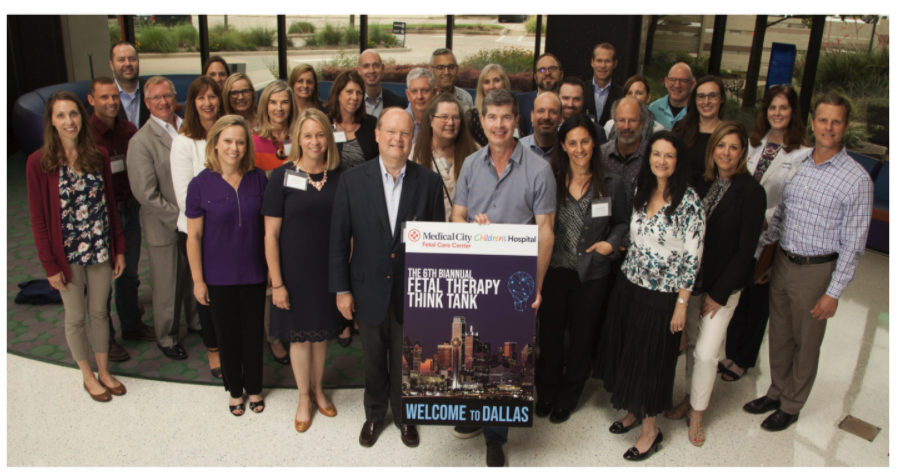PRESS RELEASE APRIL 17, 2020
Collaboration of national fetal therapy and medical industry experts designed to advance fetal medicine
The Fetal Health Foundation is excited to announce its unification with the Fetal Therapy Think Tank. The Fetal Therapy Think Tank is a consortium of diverse stakeholders in the field of fetal medicine, ranging from both academic and private clinicians to leaders representing a broad range of industries and philanthropy. The group began hosting regular meetings in 2016 with the goal of improving and advancing fetal medicine through strategic collaboration in research, innovation, and education.
Lonnie Somers, co-founder of the nonprofit Fetal Health Foundation (FHF), sees a great opportunity from the partnership saying, “This is an engaged group of leaders that includes various stakeholders and top minds in the field from major academic medical centers and healthcare systems, medical architectural firms, device manufacturers, ultrasound, MRI and echocardiographic companies. The unification of the Fetal Therapy Think Tank with the Fetal Health Foundation will create innovative solutions in fetal therapy procedures, treatments, and the devices of tomorrow, which may have much broader applications than fetal medicine.”
Somers founded FHF with his wife, Michelle, in 2006 based on their own experience with a fetal health condition. Pregnant with twins, they received a diagnosis of Twin to Twin Transfusion Syndrome and were told that there was little chance of survival for both of the twins. At the time, information and resources about the syndrome were limited; however, they managed to connect with a specialist in Florida and traveled across the country for in-utero surgery. Today, their daughters are healthy 16-year-olds who are making college plans. However, the Somers were concerned that other couples didn’t have access to the same support and care they’d received and established FHF to provide information and connections to families experiencing fetal health syndromes.
During the past fifteen years, FHF has built a platform of programs to assist families experiencing fetal syndromes and provide connections with fetal treatment centers. Dr. Kenneth Moise, a member of the Fetal Center at Children’s Memorial Hermann Hospital in Houston, is familiar with the work the nonprofit has accomplished and believes its organization and focus will strengthen the Think Tank. Says Moise, “This is an exciting opportunity for the Fetal Therapy Think Tank to join the respected Fetal Health Foundation. This union will allow FHF to assist us in informing the public about current and future developments in the field of fetal therapy.” Dr. Timothy Crombleholme, Director of the Fetal Care Center Dallas agrees, adding, “Our combined efforts will allow us to better meet the needs of fetal patients and their families, while raising awareness about prenatally diagnosed conditions that may be amendable with treatment.”
FHF hosts an online database of the most current fetal syndrome and treatment information, as well as a directory of fetal treatment centers and areas of specialty. The organization has also put into place a network of families who have experienced fetal syndromes and are willing to share their knowledge with the newly diagnosed and produces a variety of publications and materials containing valuable information for both families and fetal medicine experts. Recognizing that parents often need resources for emergency travel, FHF established a travel grant to assist families in need. In addition, the Foundation has awarded $175,000 in research grants to medical teams for development of new fetal treatments and therapies.
Talitha McGuiness, executive director of FHF, is eager to collaborate with the Fetal Therapy Think Tank. “Because of FHF’s role in disseminating information, we often hear of the latest developments at various medical facilities. We look forward to facilitating conversations between those facilities and outside firms that will likely lead to new treatments and therapies at a much more rapid pace,” says McGuiness.
Some of the issues that FHF and the Fetal Therapy Think Tank will be tackling in the near future are designing criteria and medical level designations for maternal fetal medical centers, establishing a system of collaboration and testing to expedite the development of new devices, research and therapies in fetal medicine and creating a fetal medicine curriculum and motivating medical students to pursue a career in fetal medicine. Mary Beth Martin, FHF board member and a founding leader of the Fetal Therapy Think Tank, is excited about the potential of the partnership. “I believe this collaboration will continue to further the goals of both organizations and advance the field of fetal medicine more rapidly as we strive to develop new cures and therapies for our most vulnerable patients,” states Martin.
The next meeting of the Fetal Therapy Think Tank is scheduled to take place in July 2020. More information about the Fetal Health Foundation and the Fetal Therapy Think Tank is available at https://fetaltherapythinktank.org/.

